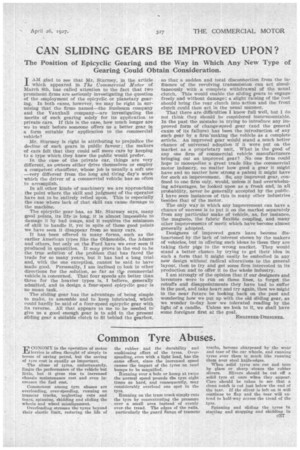CAN SLIDING GEARS BE IMPROVED UPON?
Page 59

If you've noticed an error in this article please click here to report it so we can fix it.
The Position of Epicyclic Gearing and the Way in Which Any New Type of Gearing Could Obtain Consideration.
T AM glad to see that Mr. Sturtney, in the article 1 which appeared in The Commercial Motor of March 8th, has called attention to the fact that two prominent firms are seriously investigating the question of the employment of the epicyclie or planetary gearing. In both cases, however, we may be right in surmising that the firms named—the Sunbeam company and the Vauxhall company—are investigating the merits of such gearing solely for its application to private cars. If this is the case, how much longer are we to wait before someone offers us a better gear in a form suitable for application to the commercial vehicle?
Mr. Sturmey is right in attributing to prejudice the decline of such gears in public favour ; the makers of cars felt that they could sell more cars by keeping -to a type which they knew the public would prefer.
In the case of the private car, things are very different, as owners either drive themselves or employ a competent -chauffeur, whose job is usually a soft one —very different from the long and tiring day's work which the driver of a commercial vehicle has so often to accomplish.
In all other kinds of machinery we are approaching the point where the skill and judgment of the operator have not to be entirely relied upon. This is especially the case where lack of that skill can cause damage to the machine. • The epicyclic gear has, as Mr. Sturraey says, many good points, its life is long, it is almost impossible to damage it by had usage, and it requires the minimum of skill to handle it, yet in spite of these good points we have seen it disappear from so many cars.
It has been offered in many forms, such as the earlier American types like the Oldsmobile, the Adams end others, but only on the Ford have we ever seen it produced in quantities. It may prove in the end to be the true solution of the problem that has faced the trade for so many years, but it has had a long trial and, with the one exception, cannot be said to have made good. Personally, I am inclined to look in other directions for the solution, so far as thie commercial vehicle is concerned. That four speeds are better than three for the heavier types is, I believe, generally admitted, and to design a four-speed epicyclie gear is no mean task.
The sliding gear has the advantage of being simple to make, to assemble and to keep lubricated, which could hardly he said of a four-speed epicyclic gear with its reverse. All that appears to me to he needed to give us a good enough gear is to add to the present sliding gear a suitable clutch to fit behind the gearbox,
so that a Sudden and total disconnection from the influence of the revolving transmission can act simultaneously with a complete withdrawal of the usual clutch. This would enable the sliding gears to engage freely and without damage; a slight raising of the foot should bring the rear clutch into action and the front clutch could then act in the usual manner.
That there are difficulties I know full well, but I do not think they should be considered insurmountable. In the past the mistake in trying to introduce any improved form of change-speed gear (and the general cause of its failure) has been the introduction of any such gear by a firm making the vehicle as a complete article. An improved gear would stand a much better chance of universal adoption if it were put on the market as a proprietary unit, What is the good of any one firm of commercial vehicle manufacturers bringing out an improved gear? No one firm could hope to monopolize a great trade like the commercial motor industry, no matter bow good a gear it might have arid no matter how strong a patent it might have for such an improvement. -So, any improved gear, confined to one firm only, would, unless it had overwhelming advantages, be looked upon as a freak and, in all probability, never be generally accepted by the public. I have seen instances of this in many other industries hesides that of the motor.
The Only way in which any improvement can have a chance of success is to put it on the market separately from any particular make of Vehicle, as, for instance, the magneto, the fabric flexible coupling, and many other improvements of merit which have become almost generally adopted.
Designers of improved gears have beCome disheartened by the lack of interest shown by the makers of vehicles, but in offering such ideas to them they are taking their pigs to the wrong market. They would stand a better chance by trying to get their idea in such a form that it might easily be embodied in any new design without radical alterations to the general layout, then to try and get some firm interested in its production and to offer it to the whole industry.
I am strongly of the opinion that if our designers and inventors were to run on these lines, to forget the rebuffs and disappointments they have had to suffer in the past, and take heart and try again, 'then we might in the near future be looking back on the past and wondering how we put up with the old sliding gear, as we wonder to-day how we tolerated reading by the light a a eandle. Unless we look to it, we shall have some foreigner first at the goal.












































































































